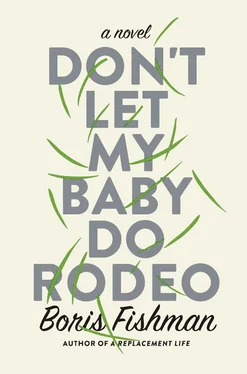And with this recollection, Alex Rubin restored to himself and his wife all the hope and faith that had been sapped by their talk with Gabe Mishkin. That’s what Alex did. He noticed things it would never occur to her to notice. Yes, he was quiet and mulish, but that’s because he was busy observing. Noticing. For instance, he had noticed that Mishkin wasn’t going to help them about an hour before she did. And had kept silent so she could unspool her act, the actress.
Maya yelped, threw her arms around Alex, and began to cover his cheek with kisses. He smiled and tried to fight her off: “Maya. . Maya. .” First, she wouldn’t listen to him, was full of childish wishes, of which he was the chaperone and chauffeur, but then she wouldn’t let him alone, again like an impetuous child. It wasn’t until a hatchback nearly met them head-on around the blind spot of the curve, the other driver setting off a squeal of her own tires, that Maya let go of Alex’s neck. As the two cars gingerly passed each other at a distance of inches, the middle-aged woman at the other wheel regarded the Rubins with hatred. However, the middle-aged woman in the passenger seat of the Rubins’ car was clapping with joy.
+
That night, without design, they slept touching hands. They had shut their lamps at the same time, a rarity, and lay in the dark on their backs, not moving. They were thinking the same thing — the license-plate variations had been given to Eugene, who had a friend at the DMV. Eugene asked mockingly who was going to give him fifty dollars for the task — on-the-side statewide checks were twenty, national fifty. Eugene was reminded that he was the first to propose that the birth parents were responsible. Maya wondered if Eugene’s exasperated attacks were a way of covering fright, not something he could betray in front of Raisa. Or was she simply imagining fright in everyone as a way of getting a hold of her own.
Maya and Alex lay next to each other and listened to the other’s breathing. Maya felt enclosed by the moment, as if she and Alex were down in a bowl while the world went on above. Her fingers reached for his forearm before she froze, fearing the touch would interrupt their stillness. But he allowed his arm to be covered, and then to be scratched lightly with her fingernails. She scratched in rows, up and down, until the motion ceased to register. Though her nails were not long, she was scoring his skin. He didn’t stop her. Eventually, her hand opened and slid down to cover his, palm down on the bed. In this way, they fell asleep. In the morning, Alex’s forearm had four raised welts. At breakfast, he rolled up his sleeve and shook his head.
As they waited for the DMV information, the Rubins performed the tasks that were required of them, but without vitality. Something had broken under the weight of the mystery in their lives. In the preceding months, they had busied themselves with the dark pleasure of addressing a problem. The Rubins loved problems — the state of mild emergency they brought on, the wagon-circling they demanded, the temporary marginalization of other, less tractable problems they suddenly authorized. It was delicious to swarm upon a new problem with a thousand solutions — the solutions really were legion, as each of them insisted on a different approach, a happy babel — to batter it with the considerable persistence, ingenuity, and force of this team of survivors and prosperers. The problem of Alex’s depressive performance at the investment bank had been resolved by new employment under his father; Maya’s shock at the amount of time the elder Rubins logged in her home was addressed by the transfer of some of her kitchen duties to Raisa; and Maya’s failure to become pregnant was solved by the arrival of Max in their lives. The Rubins loved problems. They had been born under a dark star; they had been abused by circumstance. But they persevered and survived.
But this time, they faced more than a problem. The familiar rituals of their days, the inability of someone driving by to distinguish Maya and Alex’s home from another Sylvan Gate town house: all this concealed the despair that had been settling on them since the evening with the deer. (That was the colorless designation by which the event came to be known: the evening with the deer.) A problem had finally spurred the Rubins to unanimity — in helplessness. Even Eugene seemed bereft of his usual enthusiasm. Over the previous three months their horizons had narrowed to a single point, and from this place optimism had gradually departed. On some day, the Rubins had begun to talk of almost nothing other than Max’s “difficulty.” As recently as a week before — before Gabriel Mishkin; before the Rubins took the law into their own hands by bribing a friend at the DMV; before, in other words, the matter gained a new kind of reality by involving forces beyond the family — it would have seemed perfectly sensible for, say, Raisa to propose some new remedy. However, her proposing the same now — no, the other Rubins would not have ridiculed her; exasperation and disagreement about the best solution was a luxury of more hopeful days. No, they would have simply stared in baffled silence, or nodded desultorily to avoid disrespecting her effort.
Dinner was nearly wordless, the adults trading responsibility for the small talk that would keep Max from sensing that something was off. They were relieved if he finished first and retreated upstairs; then they could be silent. Sometimes, they tried—
“He used to be so cheerful.”
“Well behaved is different from cheerful. You’re rewriting the facts.”
— but it refused to take. They trailed off because there was no way to speak about Max without conceding that they didn’t know their child and grandchild as they wished to, and that admission no one wished to make.
Max wandered the house sullenly, occasionally lifting his fingers to the side of his head and wincing theatrically. His wound had frightened him. Maya wondered if she was watching her son come to resemble his father — his adoptive father, who was as sensitive to illness as he was suspicious of doctors. At least this made her face fill with a bereaved amusement.
And then the information they didn’t want came from Eugene’s friend at the DMV. There were seventy-three license plates registered to Montana addresses with variations on the word rodeo . But there was only one plate that also featured the number one and the state’s abbreviation. However, the listing carried an address—2207 New Missouri Trail South, Adelaide, Montana — but no phone number. The Rubins called Information — no associated phone number. Who did not have a phone number in 2012? The printout looked too big for the miserly information it contained.
“So, let’s go there,” Maya said.
“Maya,” Alex said wearily. “Not again.”
The table sat in silence, as if admitting that its authority had been exceeded.
“You’re going to stop now?” Maya said. She rose and retreated to the kitchen counter, her fingers clutching her hair.
“Maya,” he said sharply. “It’s one thing to make a phone call. We’re not going to — to — Montana.” He let out an amazed chuckle. “We can write them a letter.” He opened his hands, offering a compromise, though it was clear he was giving up on this approach.
“A letter they’ll forward to the adoption agency,” Maya said. “There’s probably a law that says we can be sued for violating the agreement without their permission. Who knows what the penalty for that is. No, we have to get in front of them, Alex. I have to get in front of Laurel. I know I can speak to her. I just need to find her.”
“So let’s hire a private investigator,” Alex said. “He’ll look and see if they’re there. Then maybe I can fly by myself.”
Читать дальше












